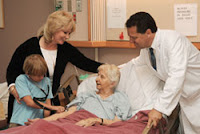 Within the health care profession, it is not uncommon to see established doctor-patient relationships. This is due to the nature of the field itself, where many patients schedule appointments with the same physician for years on end. Doctors in this type of relationship with their patients are held to a high standard, and must respond in a timely manner when called to handle one of their patient’s needs. If, however, the doctor does not respond when called by the nursing staff of the hospital, he or she can be considered negligent and medical malpractice ensues if their patient suffers a devastating injury as a result of this absence.
Within the health care profession, it is not uncommon to see established doctor-patient relationships. This is due to the nature of the field itself, where many patients schedule appointments with the same physician for years on end. Doctors in this type of relationship with their patients are held to a high standard, and must respond in a timely manner when called to handle one of their patient’s needs. If, however, the doctor does not respond when called by the nursing staff of the hospital, he or she can be considered negligent and medical malpractice ensues if their patient suffers a devastating injury as a result of this absence.Cases where a doctor may assume malpractice for failure to respond is often found within obstetrics and gynecology situations. For example, if a woman is laboring and the fetus is demonstrating signs of distress, her personal doctor (or the doctor on-call) is expected to respond if called upon by the nursing staff or other physicians. In the same situation, the nurse who examined the expectant mother may be held liable as well if he or she does not recognize the signs of fetal distress (therefore delaying to seek prompt attention from the physician.)
Another instance where a doctor can be deemed negligent of failure to respond often occurs in the emergency room setting. For example, the physician on duty in the emergency room may examine a patient and recognize the need for immediate, specialty consultation. As a result he or she will place a call to the on-call specialist, a doctor who has knowledge in a specific field of medicine. If the specialist fails to respond to the ER doctor’s request, then he or she has committed medical malpractice. Although there is no physician-patient relationship established between the specialist and the patient, there is a responsibility to respond if the specialist is on-call and agrees with the ER physician that the condition cannot wait to be treated.
Determining whether or not a doctor has committed medical malpractice by failing to respond to a call can often be difficult for a patient (or their family) to prove. However, a seasoned malpractice attorney will often have the knowledge and resources to determine whether or not the lines of communication between hospital staff members were complete and that there was documented evidence for the need of the on-call specialist.
To prove negligence on behalf of a doctor’s failure to respond, a medical malpractice attorney may have to prove some of the following key issues:
•The doctor had an established relationship with the patient
•The doctor was clearly called upon to handle his or her patient’s need
•The doctor was properly and promptly put on notice to respond to his or her patient’s need
•The specialist that was called upon agreed that immediate attention was needed (in cases of emergency room calls)
•There is documented evidence that a specialist was needed and put on notice
•The patient suffered a direct injury because of the doctor’s failure to respond
If you or a loved one believe to have been the victim of a doctor’s failure to respond or any other type of medical malpractice claim, remember that you always have the option of seeking legal help from a malpractice attorney. The Daytona Beach medical malpractice attorneys at Rue & Ziffra, P.A. have over 25 years of experience in representing the victims of nursing home abuse, medical malpractice, hospital negligence and other personal injury areas of practice.
Rue & Ziffra, P.A., proudly serves areas throughout and around Volusia County and Flagler County, Florida, including, Port Orange, Daytona Beach, New Smyrna Beach, Edgewater, Ormond Beach, Palm Coast, Flagler Beach, DeLand, Deltona, Bunnell, Orange City, Sanford, Orlando and Leesburg.
The above entry is NOT LEGAL ADVICE and should not be intended or construed as such. It is intended only as general information. No individual reading it should act upon it. Reading this entry does not create any relationship between Rue & Ziffra, P.A. and individuals reading it. If you have questions or concerns, please seek professional legal counsel.
No comments:
Post a Comment